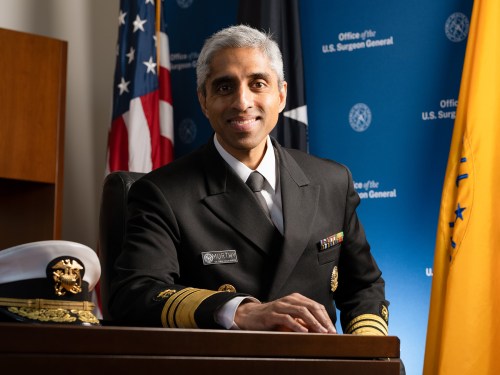Our editors independently select these products. Making a purchase through our links may earn Well+Good a commission

How Did We Get So Lonely? A Conversation With Surgeon General Dr. Vivek Murthy
The day before I meet with Vivek Murthy, MD, current Surgeon General of the United States, I spend an hour with my therapist working on how to breathe through the unpleasant interpersonal interactions I’ve been having with increasing frequency as of late. For some reason, people seem to have suddenly forgotten what it’s like to treat others with kindness; one complete stranger to whom I’ve shown nothing but respect is so inexplicably rude to me over email that I cry. Is everyone okay, I wonder?
The answer, according to Dr. Murthy, is not really. Throughout our conversation in which we unpack why Americans are feeling so low, I’m struck by just how kind Dr. Murthy is in comparison to pretty much everyone else I’ve spoken to recently. America’s doctor is likely the busiest—not to mention the most objectively “important”—person I’ve interacted with, and yet he takes time and care to humanize our interaction in a way no other professional contact has as of late. It’s no wonder, I think, he’s become the unofficial czar of connection. In just 30 minutes, he reminds me what it’s like to be rewarded by human interaction, and our conversation feels like a warm hug.
Dr. Murthy, who is now serving his second term as Surgeon General under President Biden, has made it his mission to reconnect Americans. In April of 2020, at the height of pandemic isolation, he published Together: The Healing Power of Connection in a Sometimes Lonely World, a book that highlights the ways in which the social fabric of our society is unraveling (the causes of which comprised much of our conversation), and describes how the health of both individuals and the collective are suffering as a result of widespread disconnection.
In 2023, he officially sounded the alarm with an advisory entitled, “Our Epidemic of Loneliness and Isolation1.” The 82-page report describes the ways in which human health depends upon social connection, the reasons social connection seems to be plummeting in the U.S., and the significant mental and physical health consequences of this mass disconnect (think: increased rates of depression, anxiety, heart disease, type 2 diabetes, and more). With this action, Dr. Murthy took the unusual step of declaring loneliness a public health crisis.
For Dr. Murthy, this issue is deeply personal. “I struggled a lot with loneliness at various points in my life and never really talked about it until we started working on these issues [professionally],” he says. “I didn’t realize it was so much more than a temporary bad feeling, that it had real implications for my health, and that it was something I should have addressed.”
This loneliness surfaced for him early on in life. In Together, Dr. Murthy says he first noticed it in grade school where, as a shy child, he felt lonely every single day. I tell Dr. Murthy I can relate, having been a timid gal who changed schools nearly once a year throughout middle school. We shared our mutual regret around living alone for “too many” years in adulthood—a rite of passage that is widely seen as a good thing in the U.S.—because of the subsequent loneliness and depression we experienced.
“I lived alone for a decade before I got married, and it was only in retrospect that I realized it would have been better for me to be living with other people at the time, even if it was roommates,” Dr. Murthy says. “I thought it was a step up to be able to get my own place to live by myself, and that turned out not quite to be the case.”
In interviews, Dr. Murthy has also acknowledged that he experienced profound feelings of loneliness after the end of his first term as Surgeon General. He’d been so focused on his job that he’d lost touch with friends and loved ones. “I react to stress by withdrawing and trying to be on my own and figure everything out,” he tells me. He knows it’s not a helpful stress response, but rather one that begets more loneliness (and yes, he’s working on it). After some time and uncomfortable effort, Dr. Murthy managed to rebuild the relationships he’d left untended during his first term, and learned a valuable lesson in the process: “Relationships are a buffer to stress,” he says.
Despite Dr. Murthy’s own history with social isolation, it’s been the profound loneliness he’s witnessed in others that’s impacted him most. In Together, Dr. Murthy tells the story of his uncle Rajesh, who immigrated to the U.S. ahead of his wife and children when Dr. Murthy was in middle school. Initially, Rajesh lived with Dr. Murthy’s family, and the two would keep each other company for hours after school. Outside of the home, however, Rajesh had trouble connecting with others due to language and cultural barriers.

His uncle’s struggles intensified after moving out of the Murthy home and were further compounded by a stressful job loss. Eventually, he died by suicide. After his uncle’s death, Dr. Murthy recalls looking upon the time he’d spent with Rajesh in a new light; he realized their togetherness had likely meant more to his lonely uncle than he, himself, could have imagined. The tragic experience highlighted a new truth for Dr. Murthy: You can’t always tell from the outside how much pain someone may be feeling on the inside.
Later on in life, while working as a Massachusetts-based internal medicine doctor and then as Surgeon General, Dr. Murthy would witness the devastating effects of loneliness on a much larger scale. In researching the issue, he discovered that loneliness can have profound, measurable effects on not only your emotional health, but on your physical health too.
To this end, Dr. Murthy’s 2023 advisory includes a number of alarming statistics. For example, studies show2 that poor social relationships are associated with a 29 percent increase in the risk of heart disease and a 32 percent increase in the risk of stroke. Rates of hypertension3 and type 2 diabetes4 have also been shown to increase, along with your risk of developing the common cold5. Another study6 found that chronic loneliness and social isolation can also increase the risk of developing dementia by 50 percent in older adults.
In terms of the emotional impacts of loneliness, a systematic review7 of multiple studies found that the odds of developing depression in adults is more than double among those who report often feeling lonely. Loneliness and low social support are also associated with increased risk of self-harm. One study8 of 500,000 middle-aged adults found the probability of dying by suicide was more than double among men who lived alone. Ultimately, research9 suggests that loneliness poses health risks as deadly as smoking 15 cigarettes a day—just in case you needed something more tangible in your mind.
These stats aren’t exactly uplifting. Like, “Hey, being lonely sucks, but did you know it’s also literally killing you?” And trust me; I get it. As the last single and childless person in my social circle, loneliness sent me into a deep depression that lasted half a decade, and at the time, I felt powerless to remedy the situation. Of course, I’m far from the only person who can relate to this experience. Dr. Murthy says more than one in two Americans have reported feeling lonely, underscoring the irony of this epidemic: We’re all in it together.
But what’s so different about modern society that’s making us feel lonelier than our grandparents, who, you know, didn’t even have the internet or cell phones? According to Dr. Murthy, quite a bit. This current “inflection point,” as he calls it, is the result of our uniquely American ethos—which reveres individualism—coupled with a slow snowballing of cultural shifts, technological advances, and an overall devaluing of community and human connection.
Sign Up for Our Daily Newsletter
Get all the latest in wellness, trends, food, fitness, beauty, and more delivered right to your inbox.
Got it, you've been added to our email list.










